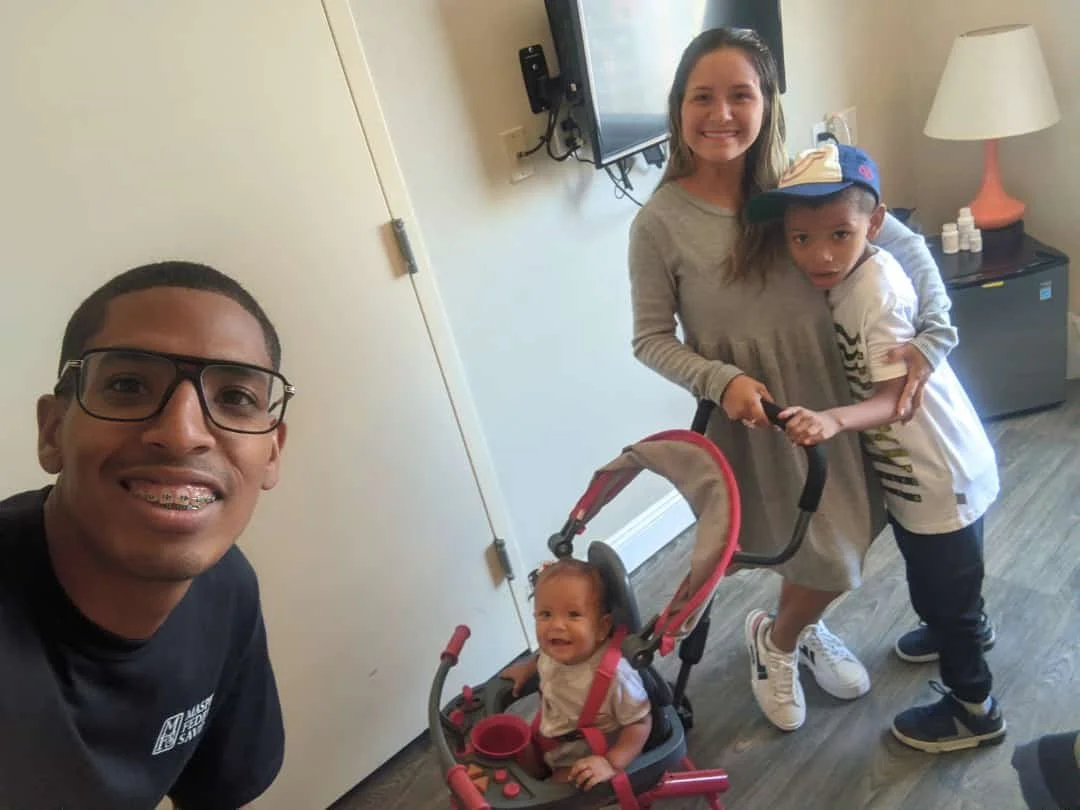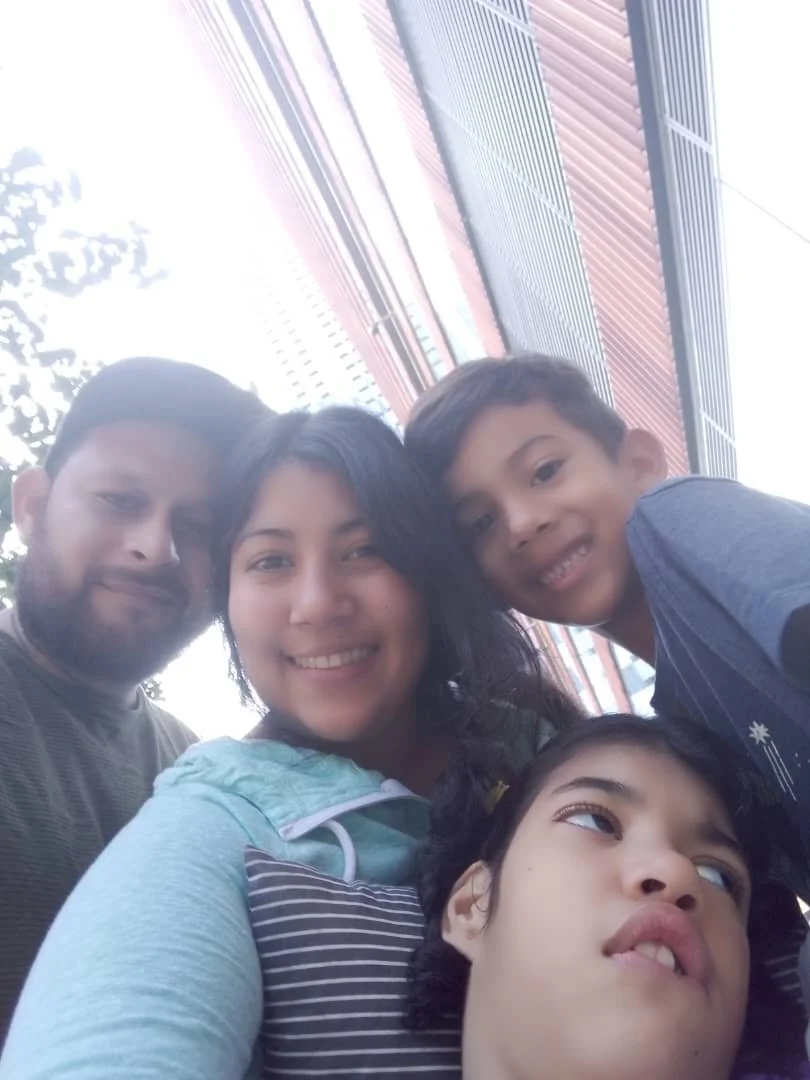Disabled migrants struggle to find accommodations in NYC
/Norwin Bolivar, Aury de Bolivar and their two children, including their 8-year-old son Mathais, who has been diagnosed with autism and epilepsy, recently immigrated to the United States from Venezuela. Photo via Bolivar family
By Christopher Alvarez
Trying to fend off a combination of kicks, punches and numerous head bangings on the window, Norwin Bolivar comforted his shaking son with a tight hug.
His 8-year-old son Mathias had just experienced a 20-second convulsion.
“One of the reasons we came from Venezuela is because the conditions were not right for my son,” Bolivar said. “We came to get a better idea of his needs and how we can help him reach his full potential.”
Bolivar recently crossed the border with his wife and newborn while carrying his eldest son on his back during their two-month journey to the United States. The trek was filled with a number of complications, including a 1-minute convulsion Mathias experienced in Costa Rica.
“There were a lot of obstacles, a lot of horrible things but we accomplished it,” said Bolivar.
But the obstacles have continued in the Big Apple, overshadowing the sense of accomplishment for some disabled migrants and their families. Recent trips to the emergency room have several of them second-guessing whether the city can actually handle accommodating their complex medical needs.
According to the Adams administration, “more than 300 asylum seekers at Health and Hospital-run humanitarian centers have indicated that they have an accessibility need that has been accommodated,” as first reported by Able News.
Yet, several families have told the Eagle that their shelter in Long Island City, which is run by a not-for-profit provider contracted with the city’s Department of Social Services and the Department of Homeland Security, that their disabled family members’ dietary needs are not being met. The shelter only serves bread, frozen foods and water, and the families are unable to cook their own food, as per city rules.
Johana Prada and her family are also among those trying to provide a better life and solutions to their daughters dietary needs. At the end of last month, after Prada’s quadriplegic daughter experienced two “scary 4-minute seizures” in a span of eight hours, she was rushed to the ER. Twelve hours later at Elmhurst Hospital, a third seizure sent the family to Mount Sinai in Manhattan.
After a series of tests, doctors concluded that life in the city’s shelter “was no way someone with this condition should be living,” Prada recalled the doctor saying.
“The doctor said she needed a better diet,” she said.
Also at the end of last month, Aury de Bolivar’s autistic and epileptic son had a series of convulsions that sent him to the emergency room for three days. The medicine he takes meant to minimize seizures has no longer had the same effect. Although doctors have not been able to find the cause of the child’s episodes, the parents attribute them to malnourishment and a lack of sleep.
In an email response to the Eagle, a DSS spokesperson denied the allegations saying: “Our shelter sites provide essential services to our clients, including access to regular healthy and nutritious meal services that comply with NYC Food Standards.”
During their visit, doctors changed Bolivar’s son’s medication in hopes that it would slowly calm the convulsions. But the mother is certain the medication is not the problem.
“It would be nice if they let us bring stuff in to cook,” said de Bolivar in Spanish.
“There are people talking about wanting to be transferred,” she added. “I’m not there yet because the process all over again is hard. But we do need better, we need to cook.”
A spokesperson for DSS told the Eagle that the agency “will work with all clients to ensure their needs are met, including in cases where an initial reasonable accommodations request is not granted.”
“If a client/family has a note from their physician indicating that they need to cook their own meals, they may request a reasonable accommodation (kitchen/cooking facility),” they added.
Bureaucratic nightmares
But even getting the accommodations have caused additional hurdles for some migrant families.
Prada recently received the letter required by DSS from a neurologist, who said that Prada’s daughter must have, “specialized soft foods to safely chew and swallow to prevent aspirations.” The letter, obtained by the Eagle, also stated that the “family requires access to [a] kitchen to cook appropriate foods.”
But a bureaucratic quagmire soon emerged.
Johana Prada and her family, who recently immigrated to the United States and has been living in the city’s shelter system. Prada’s quadriplegic daughter has specific dietary accommodations that the family says have been difficult to obtain. Photo via Prada family
Prada said the hospital wouldn’t discharge her daughter until the shelter agreed to the accommodations, or until the family found another place to stay that offered healthier options.
The social worker at Mount Sinai was not pleased with the shelter’s initial denial to accommodate, and had to seek out the attention of a person higher up in the shelter system who had to approve the new conditions.
Migrant families have also said that they’ve run into red-tape when it comes to dealing with insurance.
Diane Enobabor, founder and lead organizer of Black and Arab Migrant Solidarity Alliance and Bushwick City Farms Migrant Mutual Aid who has anecdotal experience with disabled migrants, said certain Medicaid is being denied.
“MetroPlus, Molina and UnitedHealthcare cards aren’t working,” she said. “Folks are being referred to NYC Health + Hospitals to try to get access to medication.
This has been the case for both Prada and Bolivar’s families. Their MetroPlus insurance was terminated on Oct. 31st, forcing doctors to lend their children one month’s worth of medication and medical supplies until the insurance kicks back in on Dec. 1st.
For Prada, the doctors covered her daughter’s medication in addition to donating a blender, a rice cooker and one case of Pediasure. But last Wednesday morning, the Long Island City shelter’s security officers confiscated the rice cooker after Prada walked in with some donated chicken the day before.
“There are too many examples of New York failing people and families,” said Enobabor. “These are severe cracks in an already faulty system.”
Although her Long Island City shelter began providing Prada’s daughter with specialized foods last week, Prada says the soups come cold and her daughter has experienced adverse physical reactions after eating them.
Both Prada and Bolivar believe that the treatment they received from the hospitals “was a gift from God” but they realize the better solution is to move.
“I would still like to be relocated to a better situation with better conditions,” Prada said in Spanish. “Not only do I have a disabled daughter but I have a six-year-old boy and my husband…I need to survive, not get by.”





